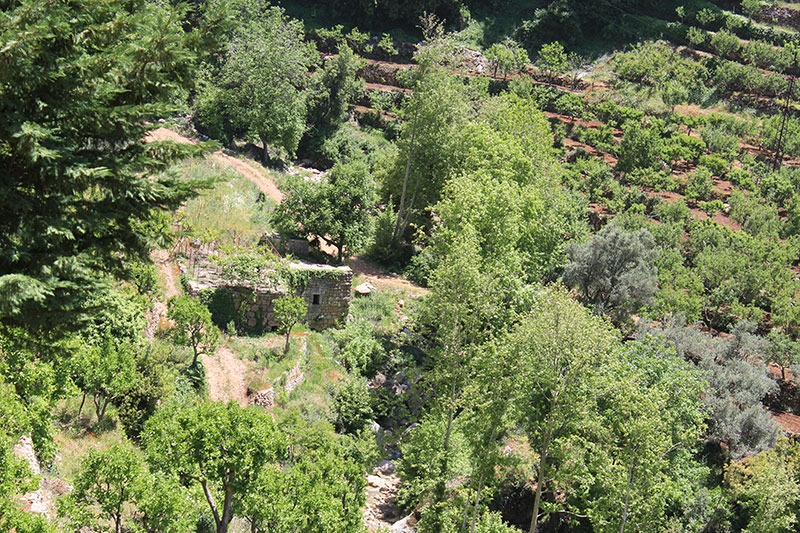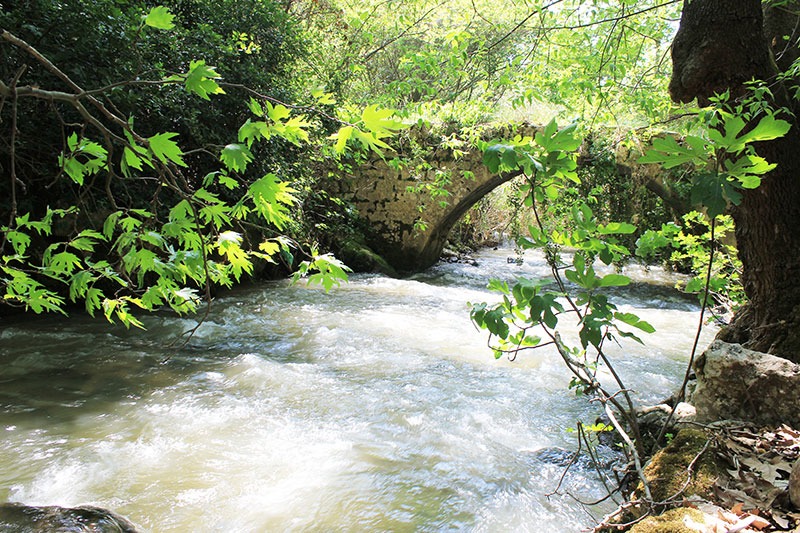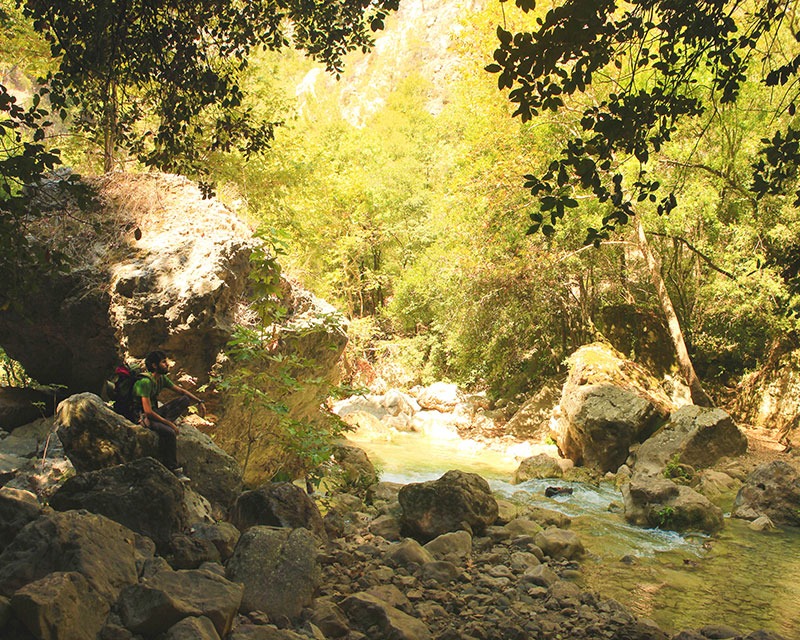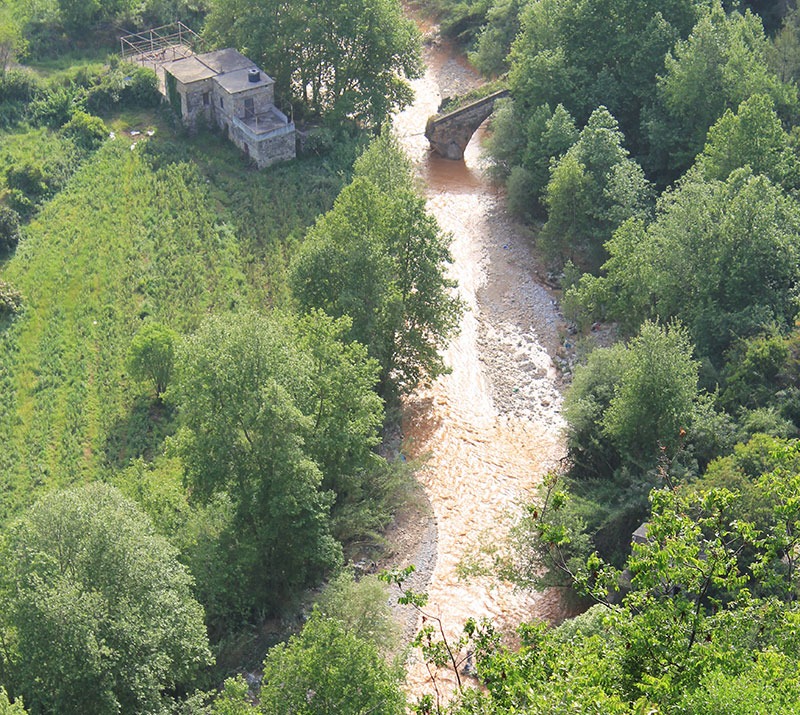More than twenty rivers in Lebanon run through deep gorges, reaching the sea or underground reservoirs. Biodiversity conservationist Elsa Sattout gets closer to the water’s edge to discover a whole host of gems along six of the country’s rivers.
1. NAHR QADISHA
 Districts: Bcharre and Zgharta
Districts: Bcharre and Zgharta
Length: 35km
The river runs the Qadisha Valley, stretching along the foothills of Mount Makmel in the northern governorate. Located 80km north of Beirut, the river originates from the Qadisha cave close to the Arz El Rab forest in Bcharre and meanders the deepest gorges of Lebanon. It can be accessed from Torza, Ser’el, Dimane and Hawka. Traditional farming is still practiced on the foothills of the valley, which is famous for a number of old monasteries. Hike in the valley with a local guide to explore the Convent of the Virgin of Qannoubine, the Chapel of St. Marina, the Convent of Saint Anthony the Great and Mar Licha. Don’t miss out on seeing the oldest printing press in the Middle East at the Convent of St. Anthony the Great.
Grab a snack at the cafeteria of the Qadisha convent or enjoy traditional Lebanese food at the numerous restaurants along the road in Hadtchit, Bcharre, Hasroun and Hadeth El Jebbeh. There are countless picnic areas lining the riverbanks in Qannoubine and in the Qadisha Valley, ideal for a chilled out lunch or barbecue.
2. NAHR EL JAOUZ

Length: 38km
Starting in Tannourine, 1,000 meters above sea level, the Nahr El Jaouz runs throughout Koura and Batroun. It meanders along riparian forests of Oriental plane trees and mixed forests of kermes oak, Judas tree, carob and broom. Highlights in the buffer zone of the river include the Citadel of El Mseilha and the Convent of the Virgin of Kaftoun. A number of restaurants, including Dar Sindianet (76 313708/03 385713) and Restaurant Nahr Jawz (03 876974), boast views of the gorge and river, with indoor and outdoor seating. Picnic spots can be found under the idyllic Oriental plane trees that border the river. Discover wheat mills and abandoned old houses dating back more than two centuries as you hike the trails along the riverbank at low altitude. In Bssatine El Essi, take some time to relax near the falls of Beit Chelalla.
A variety of restaurants can be found in Bssatine El Essi, including Tawahine (03 602945), Challal (03 494376/06 780508) and Challal Nahr El Jaouz (02 289970). For something more low-key, head to the Tannourine Picnic Park (03 242597) or have a bite in Snack El Jisr (76 336383).
3. NAHR DAMOUR
District: Shouf
Length: 38km
Fed by melting snow, which covers the Barouk Mountain during the winter, the river flows west through Jisr Al Qadi valley, then into the Shouf Mountains’ creeks. The river was named ‘Damoros’ by the Canaanites after the god of immortality, and in reference the beauty of the valley.
Hike from Dmit and visit pottery craftsmen in Jisr El Qadi village. Enjoy the epic view of canyons and deep gorges and the colorful palette of Judas trees, storax and bay laurel.
For a unique weekend experience, book a night at the EcoVillage in Dmit Valley (03 211463/03 381733) or at the Shanti 2 Tree House on the Damour River (airbnb.com).
4. NAHR IBRAHIM

Length: 23km
The Ibrahim River, also known as the Adonis, stems from the Afka Gorge. It starts its journey 1,500 meters above sea level and 71km north of Beirut, where the ruins of Aphrodite’s temple still stand. The waterfalls traverse sheer gorges and foothills, crossing Qartaba, Yahchouch and Janneh, ending up in estuaries in the town of Nahr Ibrahim on the coast. The pulsating echo of the rapid water through the narrow valley is nothing short of hypnotic.
Hiking a trail on the steep foothills affords stunning vistas of abandoned terraces and old houses. Be sure to grab a picnic basket and make yourself comfortable at one of the scenic spots along the riverbank – La Rivière (70 859474), Jalset El Nahr (70 865599), Istirahet El Nahr (03 826847) or Montazah El Wadi (03 194352). Enjoy a dip in the oxbow lake in Janneh afterwards. If you are seeking a more relaxing journey, take the car and eat at one of the traditional restaurants in Bouar.
5. NAHR EL KALB

Length: 31km
Dog River, located 18km north of Beirut, boasts Egyptian hieroglyphic stelae, Neo-Assyrian and Neo-Babylonian Cuneiforms (known as commemorative stelae of Nahr El Kalb) and Roman, Greek and Arabic inscriptions, which are preserved at the mouth of the river in Dbayeh. Discover remnants of French and Australian conquests along the river, while enjoying the scent of aromatic plants such as lavender, oregano and sage.
Local highlights include the famous Jeita Grotto, housing the world’s largest stalactites, and the monastery of Mar Abda Mochammar (Saint Abda the Guardian), which dates back to 1716.
On the south facing slopes, the Jeita Grotto Restaurant (09 220841) offers Lebanese cuisine. In the southern buffer zone of the river in Zekrit, Nahr El Janna restaurant (04 930200/70 480511) serves Lebanese dishes and seafood, and Aal Sennara offers casual dining (04 930300).
6. EL AWALI
District: Saida
Length: 48km
A perennial river flowing in South Lebanon, the El Awali originates in the Barouk Mountain at 1,492 meters above sea level. Access the river from the Saida entrance to visit the Temple of Eshmun. Hikes and bike rides will introduce you to the traditional villages of Bisri, Joune and Mazra’et El Dahr among others.
The area features remains of the Temple of Marj Bisri, the church of Saint Moses El Habchi, remains of Saint Sophia’s Monastery and Deir Saydet El Intikal (Monastery of Our Lady of Assumption), built in 1733 on the farmlands of Kashkaya. Do not miss the ruins of the castle of Lady Hester Stanhope (1773-1839) in Joune, Deir El Moukhalles (the Monastery of Saint Savior) and Deir Saydet El Bechara (Convent of the Lady of Annunciation).
Eat at the Restaurant of Eshmun Valley (07 990428) or at Istirahat El A’ilat (03 411262) in the Bisri Valley.
Loading

